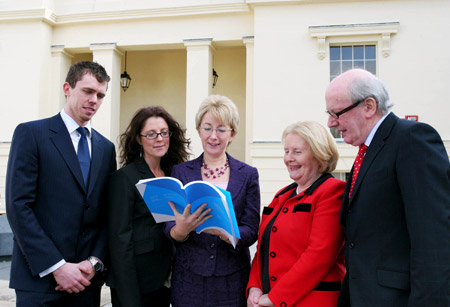TCD Researcher at Children’s Research Centre Author of National Study on Relationships and Sexuality Education in Post Primary Schools
Posted on: 15 March 2007
The Minister for Education and Science, Mary Hanafin, T.D, launched a major study on Relationships and Sexuality Education (RSE) in post-primary schools on March 13th last which was written by Trinity College’s Dr Paula Mayock, Senior Researcher at the Children’s Research Centre¹ along with Dr Mark Morgan, Head of Education Department, St Patrick’s College, Drumcondra and Karl Kitching, researcher and lecturer also of St Patrick’s College.
Launching the report Minister Hanafin said: “RSE is an important part of the education of young people in schools and the start of their lifelong learning process. As well as providing students with all the necessary social and academic skills, schools have a role to prepare young people to be able to build positive and healthy relationships and friendships as well as promote responsible decision making.”
“This comprehensive new research shows that there is clearly widespread support from teachers, parents and health professionals to the content of the RSE programme within schools. Participation in schools has increased since RSE was introduced with the survey showing 90% of schools are implementing it in some form. There are challenges remaining, and my focus in the immediate future is to ensure all schools deliver the RSE programme and promote consistency in how content is addressed,” continued the Minister.
The research project, commissioned by the Crisis Pregnancy Agency and the Department of Education and Science, examines the implementation of the RSE programme since it was first introduced in post-primary schools in the ’90s. Although a number of evaluations of the programme have taken place in recent years, this is the first time that barriers to the implementation of the programme have been examined at a national, regional and local level.
The RSE programme was introduced in 1995. It aims to help young people to develop a healthy attitude towards their own sexuality and relationships.
The research shows that significant progress has been made in the implementation of RSE, especially at junior cycle level. 89% of schools surveyed stated that they teach RSE in 1st and 2nd year.
However, 11% of schools stated that they do not teach RSE at all in 1st or 2nd year. This increased to 20% in 3rd year, 30% in the 1st year of the leaving certificate cycle and 33% by the final year of that cycle.
The study found that approximately 40% of schools are implementing the RSE programme very effectively and a further 36% have moderate levels of implementation. The programme is most effective in schools where principals ensure that a policy is developed, appoint a programme coordinator and release staff for training.
“Whole-school support” for RSE was also identified a crucial factor in schools with high implementation levels. The development of an RSE policy in consultation with the board of management, parents and teachers is of huge benefit as it clarifies for teachers what can be taught within the RSE programme in their school.
The study found that schools who develop RSE policies and have good leadership from the principal and board of management, are capable of overcoming traditional barriers such as having an overcrowded curriculum, discomfort among teachers with the content of the programme and pressure of examination subjects. Dr Mayock and her co-authors of the report have developed a model for effective implementation of RSE based on their discussions with schools who are implementing the programme effectively.
In response to the findings of the report the Crisis Pregnancy Agency and the Department of Education and Science have begun work on the development of new teaching resources for the RSE programme, covering topics such as relationships, contraception and STIs.
The Department of Education and Science will send copies of the report to all post-primary schools in the coming weeks.
The Crisis Pregnancy Agency is funding the development of a new resource for adolescents on sexual development for use by parents and teachers. The Agency is also developing a resource for parents with older adolescents. Both of which are due to be published by the end of the year.
To download a copy of the report, go to www.crisispregnancy.ie and click reports or go to www.education.ie
1. About the Children’s Research Centre
The Children’s Research Centre, Trinity College Dublin is a specialist centre focusing on specific areas of research and evaluation in the lives of children and young people. The Centre is part of the School of Psychology and the School of Social Work and Social Policy

